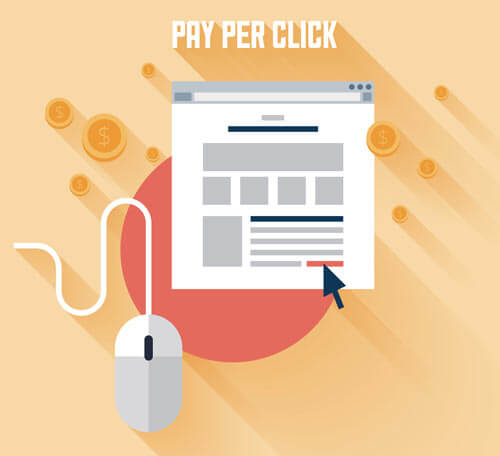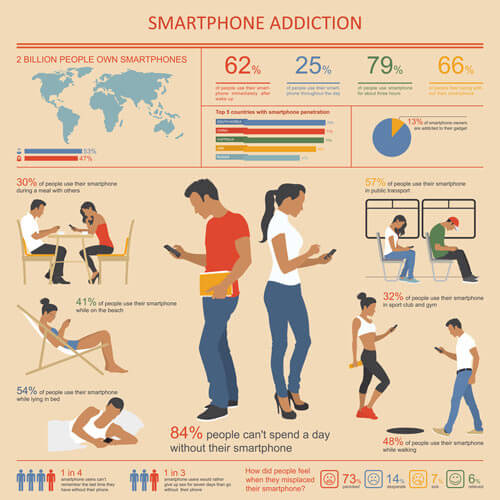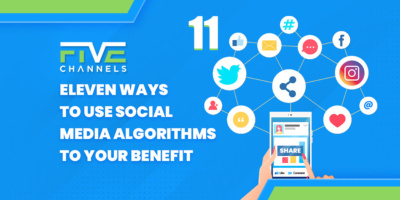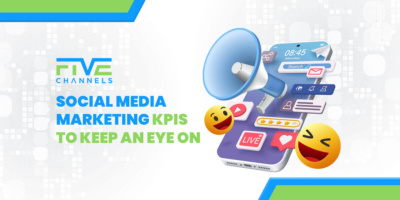Do you feel like you have a firm grasp on digital marketing for your business?
If the answer is no, you’re not alone. With the rise of the internet, marketing possibilities for companies having been ever-expanding over the past few decades. And if you don’t include these digital strategies in your marketing plan, it will leave your business in the dust.
Don’t worry- we’re here to help! In this quick and complete guide to digital marketing for dummies, we’ll explain everything you need to know about what digital marketing is and how to use it to grow your business.
Let’s get into it!
What Is Digital Marketing?
A true understanding of anything starts with the basics, so let’s cover the foundations of digital marketing now.
How It All Started
Although digital marketing came into its own in the 2000’s, it has much earlier roots. Here’s a timeline of digital marketing-related technology:
- 1981: IBM releases the first ever personal computer.
- 1989: The storage abilities of computers reaches 100 MB.
- 1995: There are 16 million internet users.
- 1996: The average American spends 30 minutes online.
- 2002: The number of worldwide internet users reaches 558 million.
- 2004: Google is public, Facebook launches, Yelp launches, Gmail launches, and users begin researching products online in the mid-2000’s.
- 2005: YouTube launches.
- 2006: Twitter launches.
- 2007: The first iPhone is released (smartphones allow consumers to make decisions anywhere, anytime- a total game-changer for digital marketing).
- 2010: By 2010, advertisers had created software for mobile, analytics, search, and social.
- After 2010: People transition from being comfortable with technology to being dependent on it.
All of these events added to the birth of digital marketing. In a society where the average person spends more than 10 hours immersed in technology per day, it only makes sense that advertisers have capitalized.

Breaking It Down
Now that we know how it all began, let’s break down the basics of digital marketing for dummies.
Simply stated, digital marketing is what you do online to capture consumers’ attention, facilitate the flow of traffic to your business’ website, get people on board with your email list, purchase what you’re selling, or download your company’s application.
What makes digital marketing unique is its measurability. Where it can be difficult to tell how many people have purchased your product because of a traditional marketing strategy (like a billboard), you can always tell exactly how well your digital marketing efforts are paying off.
Types of Digital Marketing
Don’t worry, this is digital marketing for dummies, understanding the different types of digital marketing will be simple!
Here are some popular and effective digital marketing strategies:
Social Media
 Facebook, LinkedIn, Snapchat, Instagram, Twitter…the list goes on. The average person spends almost two hours perusing social media every day!
Facebook, LinkedIn, Snapchat, Instagram, Twitter…the list goes on. The average person spends almost two hours perusing social media every day!
These platforms are a great way to promote and effectively solicit business, and there are a lot of ways in which you can do it. Advertising through influencers, running promotions, creating a buzz around your brand, interacting directly with consumers, and purchasing ad space on the media platforms themselves, are all examples of ways to market through social media.
How much does it cost? Unless you’re paying for featured ads, most forms of social media are free! If you hire someone else to manage your accounts for you, it could cost a couple hundred dollars a month.
(Top tip: social media management is a growing field. You can get cheap labor to start by finding someone interested in breaking who’s just starting out!)
SEO
SEO stands for Search Engine Optimization.
The goal of SEO is to raise your ranking in search engine results. So, if you sell custom tennis rackets in Boise and someone searches “best custom tennis rackets Boise” on Google, the goal would be to have your business’ website at the very top of the search results.
When it comes to digital marketing for dummies, SEO is the name of the game. If you’re curious about how your business ranks, you can run an SEO audit for free.
 PPC
PPC
PPC stands for Pay-Per-Click.
These ads are what you might see beside your search engine results or on websites you visit, usually with a little “sponsored” tag. Your business will only pay for these advertisements when someone clicks on them, hence the name.
The cost of PPC is all over the place. It will completely depend on exactly what it is that you’re selling.
PR
PR stands for Public Relations.
Although PR isn’t limited to the digital marketing world, it’s definitely worth mentioning. The name of the game when it comes to PR is exposure… of course, the right kind.
Reputation management is worth a mention here, too. Navigating your business’ reputation online can be challenging with so many user-based review websites floating around these days. Making an effort to defend your company’s online reputation will go a long way.
The monetary cost of PR can vary greatly. The average cost is about $125 per hour. The good news is, you can take some PR matters into your own hands which is, of course, free!
Content Marketing
Content marketing uses SEO, social media marketing, and public relations all at once with the content on your website.
For example, a YouTube video, blog, or tweet featured on your website will create content that consumers are actually interested in.
You can really create content marketing yourself. But, if you want to hire outside help, it’ll cost you around $1500-$2500 per month.
 Email Marketing
Email Marketing
Email marketing is a way to directly market to your business’ consumers.
It’s featured in digital marketing for dummies because it’s so simple. You just send out emails to a mass group of people to advertise a deal, check in with them about what’s new with your company, fill consumers in about new products you may be selling, or literally any other creative and incentivizing ways you can think of to communicate with your readers.
Email marketing is cheap! All you need is an email address and a pair of hands.
Viral Marketing
Viral marketing could mean a huge success for your company- even overnight.
You know those weird, trendy, or shocking videos that your friends will pass around, some with millions of views? They’re an example of something going viral.
If you can incorporate marketing for your business into a piece of viral media, you’ll be skyrocketing your sales in no time- now that’s digital marketing for dummies!
The costs of viral marketing come into play when it’s time to promote. You could create the most clever and on-brand video ever, that’s perfect for the current social climate, but if your Aunt Sue is the only one who sees it, that’s not going to help your business. Effective viral promotion could set you back thousands.
On the other hand, it’s not unheard of for an amateur video to take off without warning! Focus on content and creativity, and it may just get shared around the world.
Affiliate Marketing
Teamwork makes the dream work!
The only thing is, if a sale is created from this type of digital marketing, the profits are shared.
Bringing in affiliates to create leads and sales for your company means that you pay them on commission, which is decided by you. This means no up front cost!
But be careful who you work with. You’ll be sharing information about your business with whichever affiliates you choose. Make sure you trust them with that information.
That Was A Lot! Let’s Recap…
Going over each and every detail is imperative for understanding digital marketing for dummies. Here’s an overview of what each aspect does for your company:
- SEO & PPC: Both bolster the flow of traffic from search engines
- PR: Works to increase your business’ exposure
- Content Marketing: Sales, search engine traffic, exposure… it’s all included
- Email Marketing: Promotes and connects with your client base via electronic mail
- Viral Marketing: Gives your company short-term exposure
- Affiliate Marketing: Boosts your sales and leads
Why Does Your Business Need A Digital Marketing Strategy?
 Now that you have a grasp on the basics of digital marketing for dummies, how do you decide if these strategies are right for your business?
Now that you have a grasp on the basics of digital marketing for dummies, how do you decide if these strategies are right for your business?
Well, this is an easy one, because digital marketing will help any business grow and succeed, no matter how small of an online presence they start with.
Digital marketing is less about hitting the ground running with a huge online follower-ship, and more about understanding your client base and who they really are. If you get into the consumers’ heads, you’re already on your way to great success with digital marketing.
In a society where even 9% of drivers are on their cell phones at all times (I’m not condoning this, just stating the facts), ignoring digital marketing strategies is just plain stupid. And although this is the guide to digital marketing for dummies, we hope you’re already smartening up about the possibilities that are out there for your business and its growth.
Not only are people glued to their devices, but online presence matters to consumers. In fact, statistics show us that 61% of people won’t return to a website after a less-than-satisfactory experience, and 40% of those people will turn to a competitor instead.
The facts show that a whole lot of people are online, and a whole lot of people care about what they’re seeing there. Studying digital marketing for dummies shows us that advertising strategies on the web are an absolute must for drumming up business.
Digital Marketing Mistakes
Learning about digital marketing for dummies isn’t just about what you should do, but also what you shouldn’t.
Avoid common mistakes made in digital marketing by learning from others’. Here are a couple of examples:
False Confidence
Sure, in a perfect world your content would get noticed and in turn create sales for your business purely based on its quality. Unfortunately, that’s not how the world works. If you don’t take advantage of the techniques listed above, your material won’t receive the exposure that it deserves.
Going Too Hard, Too Fast
Instead of taking the time to analyze exactly what’s right for their business, some people take every avenue right away. Without careful and proper planning, digital marketing strategies will not be effective. Make sure you take the time needed to foster each strategy you choose to use individually. Trying everything at once could result in working with the wrong people and getting a result that isn’t worth what you’re paying for it.
 How To Create A Plan
How To Create A Plan
The key is to take things slow.
Now that you’re ready to create a plan for your company’s digital marketing strategy, approach things slowly and carefully. Money matters and you don’t want to be dumping thousands into ineffective marketing schemes. And of course, the last thing you want to do is cross your fingers, jump off the deep end, and hope for the best.
Here are some tips:
- Make one goal at a time
- Take the time to get to know your client base
- Stay patient
- Be picky about who you choose to work with
How To Track Your Progress
As we’ve already learned in this digital marketing for dummies guide, with digital marketing, you can track your progress. Here’s how.
The way to do this is by using an analytical software like Google Analytics. This software will provide you with KPI’s, or Key Performance Indicators.
Key Performance Indicators give you big picture indications of how effective the strategies you’ve enforced from this digital marketing for dummies guide are.
For example, an important Key Performance Indicator for blog posts would be their bounce back rate. The bounce back rate is how many people exit your website after looking at just one page. This is a great progress indicator as people tend to click around more when they’re interested.
There You Have It- Digital Marketing for Dummies!
That wasn’t so bad, right?
We hope you feel empowered by all the knowledge you’ve gained from this digital marketing for dummies guide, and feel ready to get out there and grow your business!
Hungry for more? Browse around and drop us a line- we’d love to hear from you!
Owner and Chief Marketing Officer, Jason Hall, and his team specialize in creating brand awareness / traffic and lead generation / marketing funnel and conversion optimization, while utilizing the appropriate marketing channels available within your industry. With diverse clients throughout the world, Jason's team is well connected within many industries to assist with your marketing strategies. With no long term contracts and various levels of service, Jason's team will increase the quality of your online traffic, leads, and sales.
About the author...
Located in the heart of the Emerald Coast - Destin, FL, founder and Chief Marketing Officer, Jason Hall, and his team specialize in creating brand awareness / traffic and lead generation / marketing funnel and conversion optimization / and PR campaigns, while utilizing the appropriate marketing channels available within your industry.
With diverse clients throughout the world, Jason's team is well connected within many industries to assist with your marketing strategies. With no long term contracts and various levels of service, Jason's team will increase the quality of your online traffic, leads, and sales.









